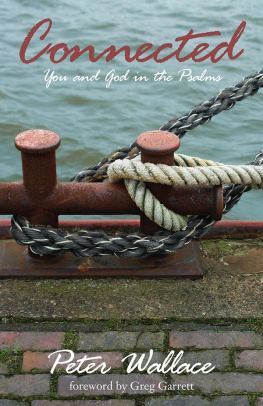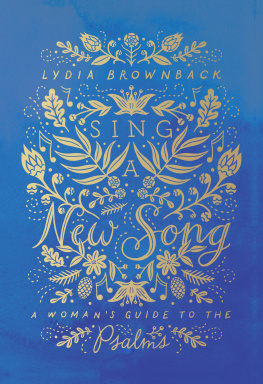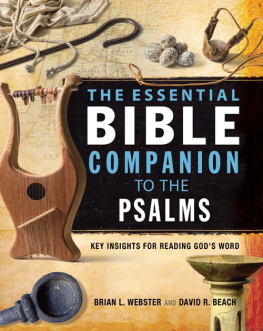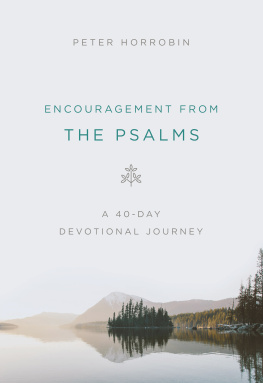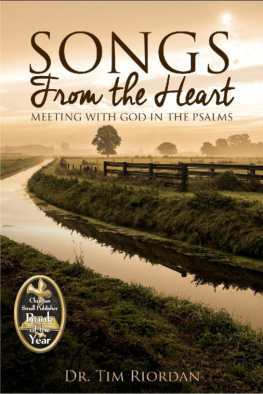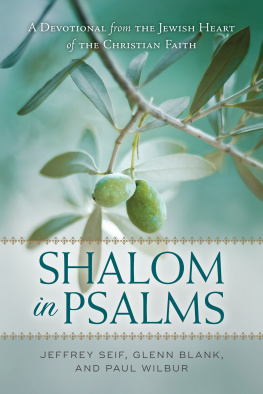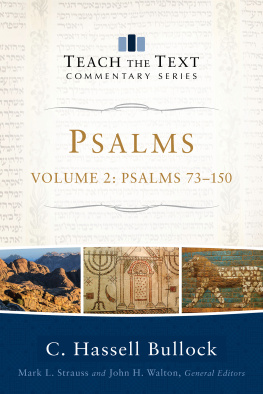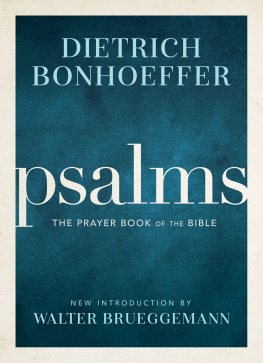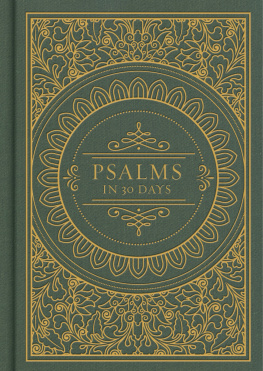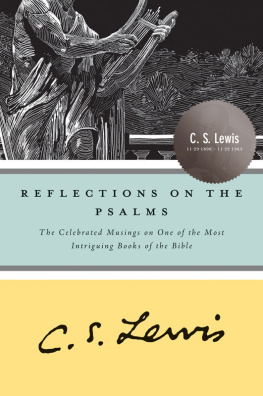Connected
Also by Peter Wallace
Living Loved
Out of the Quiet
TruthQuest Devotional Journal
Psalms for Today
What Jesus Is Saying to You Today
What God Is Saying to You Today
What the Psalmist Is Saying to You Today
Connected
You and God in the Psalms

Peter M. Wallace

Copyright 2009 by Peter Marsden Wallace
All rights reserved. No part of this book may be reproduced, stored in a retrieval system, or transmitted in any form or by any means, electronic or mechanical, including photocopying, recording, or otherwise, without the written permission of the publisher.
Scripture quotations are from The New Revised Standard Version, copyright 1989 National Council of the Churches of Christ in the United States of America. Used by permission. All rights reserved.
Some of the anecdotal illustrations in this book are true to life and are included with the permission of the persons involved. All other illustrations are composites of real situations, and any resemblance to people living or dead is coincidental. Masculine personal pronouns are used to refer to the psalmist only for convenience.
Morehouse Publishing, 4775 Linglestown Road, Harrisburg, PA 17112
Morehouse Publishing, 445 Fifth Avenue, New York, NY 10016
Morehouse Publishing is an imprint of Church Publishing Incorporated.
Cover photo by Michael Seufer www.weitesland.info
Author photo by Simon Cowart
Cover design by Jennifer Glosser
Library of Congress Cataloging-in-Publication Data
Wallace, Peter M.
Connected : you and God in the Psalms / by Peter Marsden Wallace.
p. cm.
ISBN 978-0-8192-2308-1 (pbk.)
1. Bible. O.T. PsalmsDevotional use. 2. SpiritualityBiblical teaching. I. Title.
BS1430.54.W35 2009
242'.5dc22
2009005949
Printed in the United States of America
09 10 11 12 13 14 10 9 8 7 6 5 4 3 2 1
acknowledgments
T he author wishes to express his deep appreciation to his editor, Cynthia Shattuck, and the staff at Church Publishing; to Skip Schueddig and the team at Day1 and the Alliance for Christian Media; to his family and friends who are such an encouragement; to Michael Seufer for his friendship and photography; to Greg Garrett; and to Danh Le.
by Greg Garrett
L ast week I was teaching the psalms in a graduate seminar on grief and suffering in literature. I asked the class how they had encountered the psalms before our formal study together, and the answers were pretty typical. One student talked about being raised Catholic, hearing the psalms chanted in liturgy, and basically ignoring them Sunday after Sunday. Another talked about how a hand-picked set of psalms had been a part of her devotional reading, reinforcing ideas about Gods goodness and blessing. And one of my students, God bless him, raised his hand and confessed, Ive never really been able to connect with the psalms. Most of them, I mean. Ive lived a really happy life. Nothing bad has ever happened to me. Ive never felt persecuted, or hopeless, or near death.
Okay, I said, and we moved on, although inwardly I was thinking, Oh, honey. Enjoy it while you can.
Because, although I fear this does violence to both Psalms 1 and 23, happy indeed is the one who has not walked through the valley of the shadow of death.
Lucky, in fact.
Fortunate.
And while of course I dont wish my student illor any of those fortunate ones who have walked through life so far resonating only with the psalms of praisewe know that eventually all of us will know suffering and trial because that is the nature of life, a truth the psalmists knew, clearly, from experience. As Thomas Cahill writes, the psalms are perhaps our earliest example of literature with an I connected, of interior wrestling, of writers on an emotional journey in the presence of the Living God. The psalms, he says, are a treasure trove of personal emotions from poets acutely attuned to their inner states, from ancient harpists dramatically aware that spirit calls to Spiritthat their pain and joy can find permanent satisfaction only in the Creator of all.
I know a little something about these things myself, pain, and joy, and satisfaction in the Creator. Unlike my student, I have felt persecuted, hope less, or near death, and like many who have faced one or more of these situations, the psalms spoke to me when almost nothing else didor could. In weary years when life seemed too difficult to go on living, Psalm 27, a psalm of David, often came to my lips, a repeated hope of connection to God despite everything:
The L ORD is my light and my salvation;
whom shall I fear?
The L ORD is the stronghold of my life;
of whom shall I be afraid?
(Ps. 27:1, NRSV)
And my experience echoes the experience of other souls, whether faithful or searching, for thousands of years. As Robert Alter notes in his introduction to his own recent translation of the psalms, these verses of Hebrew praise and lament have been at the foundation of Jewish and Christian life, the most urgently, personally present of all the books of the Bible in the lives of many readers. It is this knowledge of the personal power of the psalms that Peter Wallace carries into the book that you are holding, a book that attempts to strengthen and broaden our experience of the psalms so that they will continue to speak to us today.
Peter Wallace understands the power of the psalms, and the need to engage themall of them, praise and lament and confusion alike. Through the use of his own experiencehis own inner lifehe opens up each of the psalms for us so that we can see them anew, while in his concluding prayers for each section, he acknowledges the difficulty of many of these texts, the trials in many of our livesand the ongoing goodness of God.
Ultimately, the psalms are about connecting to God, in good times and in bad, when we see hope shining everywhere and when we are in the valley of the shadow. Peters strong and consistent focus on connection makes this book one to be savored and returned to. I hope it will highlight that connection for you and draw you into the knowledge that, as Peter writes in one of his prayers, God is still our place of refuge:
Thank you for being the exalted God who knows and acts and is. Thank you that in the midst of a world of change, you are the changeless One.
Happy is the one who knows this.
Fortunate, even.
Greg Garrett
Baylor University
Austin, Texas

Thomas Cahill, The Gifts of the Jews (New York: Anchor, 1998), 19899.
Robert Alter, The Book of Psalms (New York: W. W. Norton, 2007), xiii.
R io de Janeiro is an astonishing city. Everywhere you look, in any direction, you see something beautiful. Or surprising. Or funny. Or frightening. Or overwhelming.
The city is surrounded by wide, clean beachesLeblon, Ipanema, Copacabanacrowded with sun worshippers of all shapes, sizes, ages, nationalities, and backgrounds. The urban center is populated by uniquely Brazilian modern architecture, including the Catedral de Sao Sebastian, a pyramid-shaped skyscraper that literally takes your breath away when you walk into its soaring sanctuary.
Wherever you turn in Rio, you see massive jungle-shrouded mountains jutting into the sky at odd angles, including the famous Sugarloaf Mountain and the Corcovadohome of one of the most impressive and inspiring religious statues in the world: Cristo Redentor, Christ the Redeemer, who towers over all with his arms outstretched in graceful invitation.

